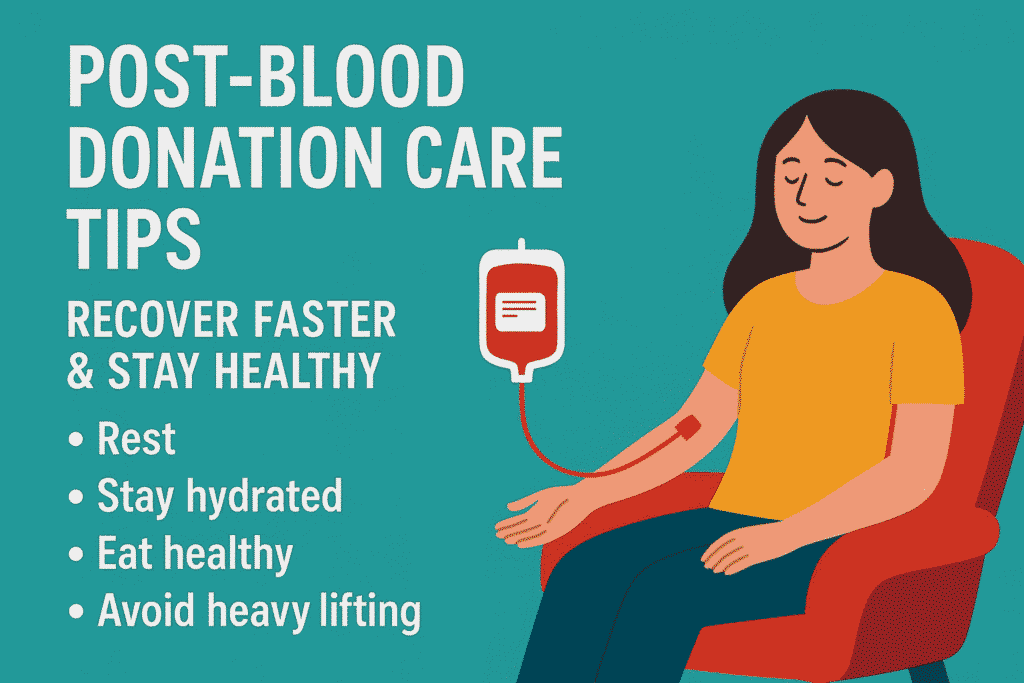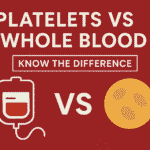Donating blood is one of the simplest yet most powerful ways to save lives. A single donation can help up to three people in need of blood transfusions. While the process is safe and straightforward, it’s essential to care for your body afterward to ensure a quick recovery and maintain good health.
If you’ve recently donated or plan to donate soon, here’s everything you need to know about post-blood donation care.
1. Rest and Relax Immediately After Donation
After donating blood, your body temporarily loses about 350–450 ml of blood. To help your body adjust, sit or lie down for 10–15 minutes at the donation site. This resting period helps prevent dizziness or light-headedness.
Avoid rushing to stand up or drive immediately after donating. If you feel faint or dizzy, inform the staff — they are trained to assist you quickly.
2. Stay Hydrated
One of the most important steps in post-donation care is hydration. Drink at least 3–4 extra glasses of water (or healthy fluids like coconut water, fruit juice, or lemon water) throughout the day.
Fluids help your body replenish the volume of blood lost and restore normal circulation. Avoid alcohol or caffeine for 24 hours as they can dehydrate you.
3. Eat Iron-Rich and Nutritious Foods
Your body needs iron and nutrients to rebuild the red blood cells you’ve donated. Include foods like:
-
Spinach, beetroot, and broccoli
-
Lean meats, fish, and eggs
-
Legumes, lentils, and nuts
-
Citrus fruits (like oranges, amla, and lemons) that help in iron absorption
Avoid heavy, oily, or spicy foods immediately after donation as they can cause discomfort or nausea.
4. Avoid Heavy Workouts or Lifting
Even though you might feel fine, it’s best to avoid strenuous activity for at least 24 hours after donating blood. This includes heavy workouts, sports, or lifting weights.
Your body needs time to recover, and overexertion might lead to fatigue or fainting. A light walk or gentle stretching is fine — but listen to your body and rest if you feel weak.
5. Keep the Bandage On
Keep the small bandage or tape on your arm for at least 4–6 hours after donation. Avoid washing that area immediately. If you notice slight bruising or tenderness, apply a cold compress for 10–15 minutes.
It’s normal to have a mild bruise — it will fade within a few days.
6. Monitor How You Feel
Feeling slightly tired or light-headed after donating blood is common, but if you experience symptoms like:
-
Continuous dizziness
-
Excessive bleeding
-
Persistent nausea or fatigue
Then contact the donation center or your healthcare provider. Staying alert to your body’s signals helps prevent complications.
7. Give Your Body Time Before Donating Again
For most healthy adults, the recommended gap between whole blood donations is 3 months for men and 4 months for women. This gap allows your body to restore iron and red blood cell levels naturally.
If you’re donating platelets or plasma, the frequency might differ — consult your doctor or donation center.
8. Feel Proud of Your Contribution
By donating blood, you’ve played a vital role in saving lives — from accident victims to surgery patients and those fighting chronic illnesses. Taking care of yourself afterward ensures you can continue donating safely in the future.
Quick Summary: Post-Blood Donation Care Checklist
-
Rest for at least 10–15 minutes
-
Drink plenty of water
-
Eat iron-rich foods
-
Avoid alcohol and caffeine
-
Skip heavy exercise for 24 hours
-
Keep the bandage on for a few hours
-
Monitor for dizziness or fatigue
-
Wait 3–4 months before your next donation
Final Words:
Blood donation is a noble act of kindness that doesn’t just save lives — it strengthens the bond of humanity. With proper post-donation care, you ensure your body stays strong and healthy, ready to help again in the future.


